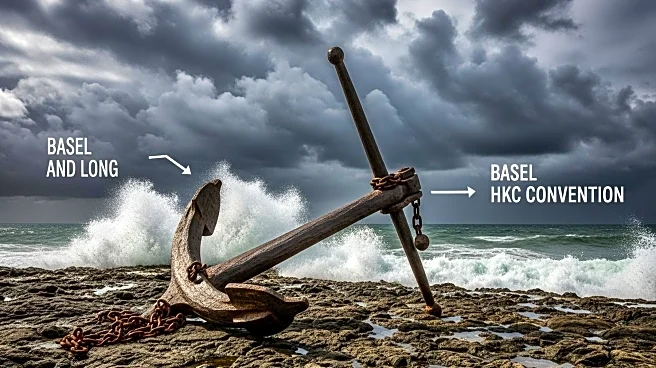What is the story about?
What's Happening?
The ship recycling industry is currently navigating complex regulatory challenges following the recent implementation of the Hong Kong International Convention for the Safe and Environmentally Sound Recycling of Ships (HKC) on June 26, 2025. This new convention is designed to improve safety and environmental practices within shipyards. However, it has raised questions about its interaction with the older Basel Convention, which governs the transboundary movement of hazardous wastes. In countries like Bangladesh, which are major players in ship recycling, this regulatory overlap has significant implications. The Basel Convention mandates strict controls over hazardous waste management, while the HKC focuses on shipyard-level practices. This division has led to confusion and potential misinterpretation, with some stakeholders arguing that the HKC should take precedence, potentially undermining Basel's stringent requirements.
Why It's Important?
The coexistence of the HKC and Basel Conventions is crucial for ensuring both environmental protection and the sustainability of the ship recycling industry. The Basel Convention's comprehensive approach to hazardous waste management is vital for protecting vulnerable communities and ecosystems from the adverse effects of improper waste disposal. Meanwhile, the HKC aims to enhance safety and environmental standards within shipyards. The tension between these two frameworks highlights the need for clear jurisdictional boundaries to prevent regulatory overlap and ensure that environmental safeguards are not compromised in favor of business interests. This issue is particularly pressing in developing countries like Bangladesh, where the ship recycling industry is a significant economic driver but also poses substantial environmental and health risks.
What's Next?
To address these challenges, it is essential for countries like Bangladesh to clearly delineate the responsibilities of the HKC and Basel Conventions within their domestic legal frameworks. Strengthening the capacity and authority of environmental agencies, such as Bangladesh's Department of Environment, is crucial for effective enforcement of Basel's downstream obligations. Additionally, international support for ship recycling should align with Basel's standards to ensure comprehensive environmental protection. Civil society and NGOs must also play a more active role in advocating for balanced policies that do not prioritize commercial interests over environmental and public health concerns.
Beyond the Headlines
The ongoing regulatory challenges in the ship recycling industry reflect broader issues of environmental justice and governance. The influence of powerful shipping nations and industry associations in shaping international rules underscores the need for equitable representation of developing countries and affected communities in policy development. The concept of 'environmental colonialism' is evident in the way global commerce can impose environmental burdens on less powerful nations without adequate safeguards. Ensuring that both the HKC and Basel Conventions are respected and effectively implemented is not only a matter of legal coherence but also a step towards achieving sustainable and fair industrial practices.














